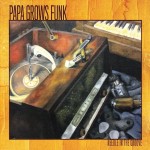Back in the 20th Century when John Gros was enrolled in the George Porter, Jr. Academy of Funk as a member of the Runnin’ Pardners, he also held down a bread and butter gig playing for tourists at Tropical Isle. Gros never complained about playing the hits on Bourbon Street, though. He studied the crowds to see what hooks or choruses from the pop rock songbook people responded to. That pop savvy is one of the key elements that separates Papa Grows Funk from the rest of New Orleans funk hierarchy, even though funk’s reliance on the playing skills of band members made Gros’ instincts for pop hooks and catchy melodies a subtle subtext in the groove-heavy jams the band is known for.
PGF’s four albums have done a good job of translating the group’s energy in the studio, but Needle in the Groove is the first PGF recording that sounds like it was crafted to be a pop record. It is far from a Gros takeover, however—reedman Jason Mingledorff, guitarist June Yamagishi, bassist Marc Pero and drummer Jeffery “Jellybean” Alexander are all as important to the sound as Gros’ keyboards and vocals. Significantly, all the titles are credited to the group, although I’d guess that Gros brought at least “Make It Right Now,” “Planet of Love and Hate” and the title track to the table.
More importantly, the band called on two outside producers, Allen Toussaint and Better Than Ezra’s Tom Drummond, to make what could have easily become two distinct albums. The result is a great record that works out in the tracking order as a carefully constructed session of songs supervised by Drummond and designed for contemporary airplay sandwiching a classic New Orleans R&B session. Using Drummond’s work to frame the album and Toussaint to define the core identity of the band is a master conceptual stroke because everything on the album feels in its right place.
Drummond’s influence is most obvious on the opening track, “Do You Want It,” a group vocal over a popping bass line and electronically enhanced drum beats. The song is the most modern-sounding track on the record, and it segues into what has been one of the band’s most expansive recent live vehicles, “Make It Right Now.” But that song is positively sculpted here, with the keys to the band’s sound all in the details—Yamagishi’s subtle rhythm guitar track; the way Gros’ vocal hovers over the mix; the understated vocal chorus under Mingledorff’s tenor solo. Mingledorff is at the center of the first of Toussaint’s tracks, “Yes Ma’am,” playing the theme on alto and accenting it with a funky baritone overdub. The band is swinging on a clavinet-driven syncopation as intricate as a Cupertino motherboard, and when Yamagishi unleashes his one chorus solo, it’s clear the maestro has worked his magic.
Drummond’s meticulous handling of “Planet of Love and Hate” offers a revealing contrast between a style intended to craft a sound and Toussaint’s instinct for letting a band find its own direction, as he does brilliantly on the Meters-like instrumentals “Red Spark” and “Out of the Mud.” Gros gets a gorgeous B-3 organ solo on the former and Yamagishi plays his best choruses of the album on the latter. Toussaint’s stamp is also clear on the closest thing to a ‘60s R&B track on the record, Gros’ piano and vocal romp “Back Home,” a clear illustration of how he utilized that songwriting information he studied at Tropical Isle.
The band emerges from the fat mini-set of Toussaint-produced tracks into Drummond’s summation, the quick, airy instrumental “Rollo,” which appropriately “rollos” along on a crisply percolating bass line, and the finale, “Needle in the Groove.” This may be the most ambitious song Gros has ever written, and Drummond arranges the rhythm track to add drama to the story line.
Papa Grows Funk has established itself as one of the more popular New Orleans exports on the touring circuit, but the band’s ambition to become something even more led PGF to consult with two of the city’s great producers. The result is an album that defines the band once and for all.





